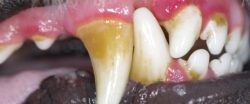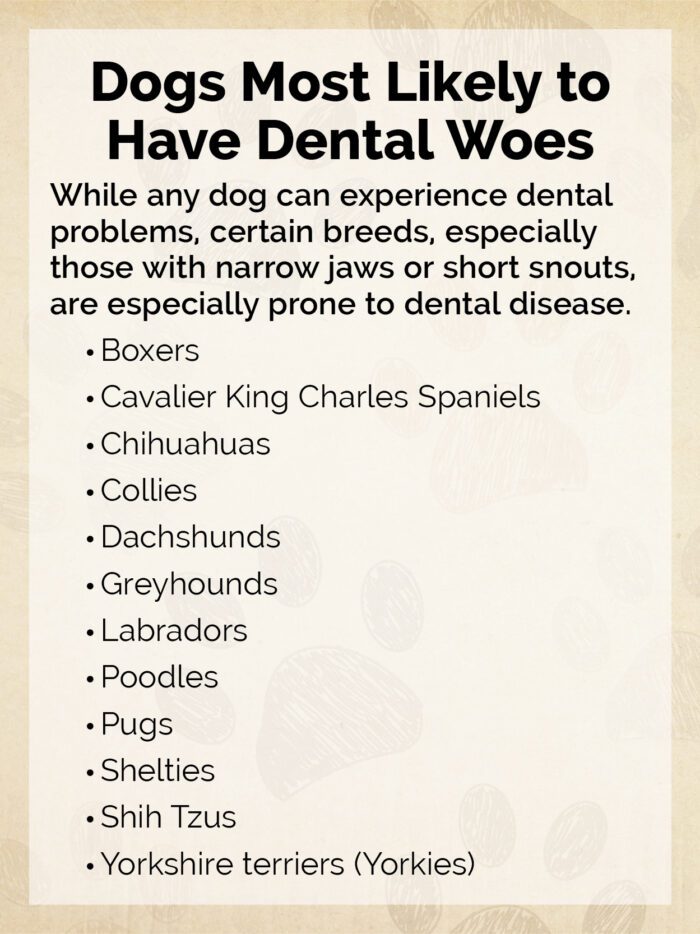While dog owners occasionally joke about their best friend having “doggie breath,” the fact is, this common occurrence may indicate a far more serious condition. But it can be tough to keep a dog’s teeth clean to avoid other potential health problems, especially if your dog is like most and resists regular toothbrushing. Fortunately, there are nutrients that can help keep their teeth and gums healthy.
CoQ10 and propolis are two of them. Given in a chewable form, this combination addresses some of the most common canine dental health issues:
Stops the growth of harmful bacteria
Fights damage to gums and teeth
Freshens breath and eliminates the cause of “doggie breath”
While behavioral issues like anxiety, or joint problems like arthritis, are some of the top reasons for visits to the vet, periodontal disease is one the most common conditions in dogs. As many as 20 percent of oneyear- old dogs may have loose teeth due to plaque buildup, and dental problems have been reported in over 18 percent of dogs after their vet visits.
The first hint of dental issues in your best friend might be an odor we call “doggie breath” that isn’t just temporary and associated with eating. The second hint is one you’ll see—a buildup of plaque on your dog’s teeth. And that’s where the problems start.


Gingivitis—inflammation of the gums caused by plaque—is often the first cause of a dog’s bad breath. The smell is the result of bacteria in the plaque and the inflammation it causes. But it isn’t a permanent condition; with cleaning, brushing, coarse-textured dental treats that help scrub off the plaque, and with supplementation, it can be addressed.
However, if plaque is left on the teeth, your dog can develop periodontitis, which can lead to tooth loss.
Dog breeds that are more susceptible to gum disease include poodles, Yorkshire terriers (Yorkies), chihuahuas, and boxers.
Smaller dogs with smaller mouths or shorter, flatter faces can be prone to dental issues because their teeth are in a compressed space and are harder to clean. But the truth is, some dogs are simply more susceptible to issues with their teeth and gums than others, regardless of their breed—including larger dogs that may crack or fracture their teeth.
But even though dental issues are common, solutions aren’t. Professional cleanings at the vet are expensive and almost always require your dog to be sedated, and many dogs resist home toothbrushing, so plaque can feel like an unstoppable problem. Nonetheless, it is critical that you step in and help.
Fortunately, bolstering your dog’s protective defenses with CoQ10 and propolis can clear up the causes of “doggie breath” and help prevent serious dental conditions.
CoQ10 for Healthy Teeth and Gums
Coenzyme Q10, generally known as CoQ10, is present in virtually every cell in the body, which is why the forms of the nutrient are called ubiquinone or ubiquinol due to its ubiquitous nature. CoQ10 is vital for generating energy, including creating adenosine triphosphate (ATP), the natural fuel, the natural fuel that powers the body at a microscopic level. But regardless of the ubiquitous nature of CoQ10, deficiencies are fairly common. Low levels of CoQ10 are associated with heart disease, Parkinson’s and Alzheimer’s diseases, and, interestingly, periodontal diseases. For canines and humans alike, CoQ10 levels decline with age, physical stresses, or acute and chronic illness. While there are food sources of CoQ10, the quantities in those sources are low, so supplementation is the best option.
In human clinical studies, CoQ10 has been shown to be an effective way to keep teeth and gums healthy, along with regular professional cleaning. That may be because early research found that individuals with periodontal disease also had low levels of CoQ10 in the tissues surrounding the teeth, with one study reporting that 60 percent of the 40 tissue samples showed a deficiency in the nutrient. CoQ10 inhibits inflammatory cytokines that are elevated by periodontal bacterial inflammation, and it reduces systemic oxidative damage, which is also a prime cause of dental problems, so it is an important nutrient to keep teeth and gums healthy and clean.
Fortunately, levels of CoQ10 can be improved, with better dental health as the result.
In fact, one clinical trial reported that CoQ10 had a strong anti-gingivitis effect on plaque after just one treatment. While those results were seen with a topical gel applied to the gumline, a chewable tablet form, given regularly, should have a similar effect for dogs as well.


Propolis Stops Bacterial Infections
Propolis is a flavonoid and polyphenol-rich material collected from plants and trees by bees, and then modified by the bees’ own enzymes into a protective antibacterial material they use for protecting their hives. Since ancient times, propolis has been used medicinally. Supplemental forms, purified into a nutrient-rich powder, continue to be intensively studied and recommended today—for good reason.
Propolis has been shown in human clinical studies to stop bacterial infections and may help reduce the need for antibiotics. Human clinical studies show that propolis can reduce the duration and severity of ear infections and researchers believe that it may do the same for canines as well. Research also has shown that propolis can have a positive impact on dental health.
When propolis is applied along the gum line, it can act as a preventive for gingivitis and dental caries, and stop structural damage to the teeth including the tooth root. One study showed that a mouthwash with propolis decreased plaque buildup by 61 percent. But since mouthwashes may be a bit tricky to administer to a dog, I think that propolis in a chewable tablet is a much more practical solution.
Additionally, propolis has been shown to reduce sensitivities in the dentin, the layer of the teeth just below the enamel, which is not surprising, since the nutrient is also a strong anti-inflammatory. If you’ve ever experienced a sudden painful sensation in your tooth when you ate or drank hot or cold foods, you’ll know what that feels like. Similarly, older dogs with some enamel loss or gum recession, or any dog— especially breeds prone to periodontal disease—can have sensitivities, too.
For canines, supplemental propolis is a safe and effective natural medicine to stop dental issues. Plus, propolis provides our best friends with a boost for their immune responses. If they have allergies, for instance, this nutrient may help balance those responses and reduce the levels of pro-inflammatory cytokines that can cause respiratory symptoms or make them itchy and uncomfortable.
Supplementing Made Simple
We always want what’s best for our dogs—it’s what we believe they would expect from us. But sometimes it can be a challenge to brush any dog’s teeth, which is why I believe that a chewable supplement with CoQ10 and propolis is the perfect choice for those times when brushing just isn’t in the picture. Besides being in the form of a treat—and making what could be a chore into a reward for your dog—chewable forms help distribute these protective ingredients along the gumline, exactly where they are needed to protect the gums and teeth from damage.
So, if your dog’s breath seems a little “off,” and you want to help them live their best, I urge you to add CoQ10 and propolis to their daily regimen. Plus, while these nutrients are helping freshen breath, clean teeth, and prevent gingivitis and periodontitis, they’ll help keep your best friend’s heart and brain healthy and stop respiratory issues and allergies, too. And that’s giving them a treat that will put a smile on your face, too.
